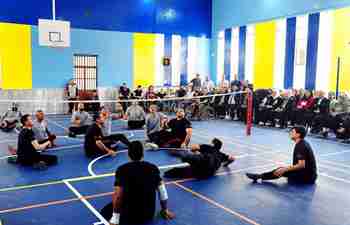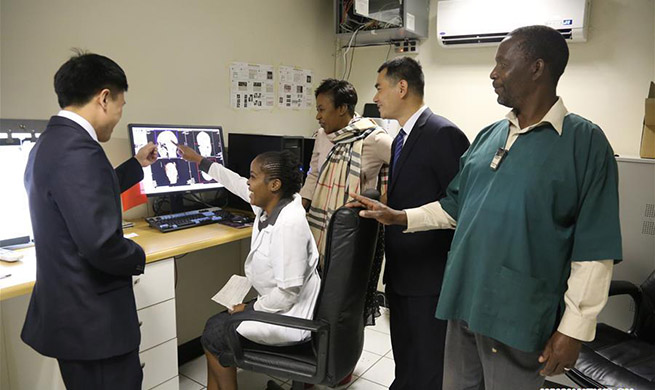by Xinhua writers Zhang Nianwu, Liu Hongde, Ji Xiaobo
BEIJING, Aug. 19 (Xinhua) -- "Pets are lonely when their masters are away from home, and we are here to reduce their loneliness," said Yang Xu, a product manager of AntHouse. "It also helps to ease people's concerns when their pets were left home alone."
Yang attended the 2018 World Robot Conference, a robotics gala held in Beijing from Wednesday to Sunday comprising of more than 160 domestic and international corporations.
Xiaoyi, a pet companion robot from AntHouse, a Shenzhen-based robotics company, functioned as an automated entertainment-partner and a dog-feeder. It also functions in "remote control mode", allowing people to interact with their pets via live feeds displayed on their complementary app.
Robots are not a new topic in China. As the world's largest industrial robot-market, China hit a sales record of 141,000 units in 2017. The Chinese witnessed a variety of robotics application in art and other realms. A calligraphy-writing robot in 2016 and a bionic-jellyfish robot in 2017 mesmerized attendees at previous world robot conferences.
This year, above and beyond conventional industrial and service robots, companion robots enthralled all who were present. The integration of routine services and emotional care highlighted the biggest difference between companion robots and the others.
P-Care, a senior-care robot from Zhongrui Funing Robotics Co., Ltd is capable of examining health conditions, delivering food and medicine as well as assisting seniors to move about. It even helps them to shower.
"It frees nurses from their dirty and dull routines," said Wang Daning, vice president of the company.
"Emotional consolation and individualized communication are keys to companion robots," Wang told Xinhua, "through facial detection, P-Care can distinguish each elderly and directly call out his or her name. It can also differentiate the elders' moods and provide the appropriate responses, including singing a song to entertain or connecting elders with their relatives to relieve their loneliness."
Xiaowu on the other hand, is a children companion robot from Hanwuji Intelligence, and offers age-based interactive content to communicate. Among them, allowing scheduled connection and interaction between parents and their children.
Xiaowu can sing and dance with children, deliver lectures as well as tell bed time stories. It can also automatically take photos and videos through voice-activation or via app-instruction.
"Companionship is important, but in today's life, we don't really have enough time to spend with our children or loved-ones," said Hu Yingjun, a mother of a 6-year-old. "An interactive robot can become my kid's good buddy and give him more joy."
Though these companion robots attracted many visitors at the exhibitions, the producer said that they still faced many challenges from the market.
"The fact is, we (the robotics companies) are all thriving to get market recognition," an employee at Hanwuji Intelligence told Xinhua, "over the last two years, at least 70 percent of the companies that focused on companion robots went bankrupt."
"In order to truly relieve people's need of companionship, robots need more than 'a heart and mind' to hear and understand, but also a real sense of touch and warmth. As for the companion robots in market, I must say, the technology gap between the ideal and reality is still huge." said Liu, a conference visitor who currently studies in a psychology masters' program in the Chinese Academy of Sciences.
However, Hu noted that robots can never replace real-life parent-companionship. She herself preferred interacting with her child in person whenever time allowed.
Yang from AntHouse also admitted that the pet companion robot is only an alternative option for people when they are too busy to look after their pets, "we still love playing with our pets in person," he said.
Toshio Fukuda, an international leader in the field of robotics and automation who attended the conference, told xinhua that companion robots can serve as peoples' effective helpers in fields such as in education and health care. "Once I was sick and lying on bed for months, at that time, I dreamt to have a flying robot to take care of me myself," said Fukuda. On the other hand, while fully recognizing the value of interactive robots, Fukuda also stressed that robots must be "human-centered".
"Robots should not be making demands from people; instead, robots have to be behind us. They can provide information or materials or whatever else we need, and we have to be in front of them," Fukuda said.
(Zhou Xinyang, Kong Jiachen also contributed to the story.)

















